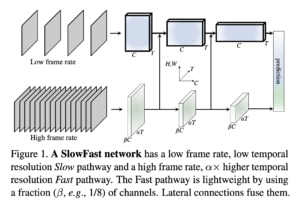SlowFast
使用示例
导入
加载模型
import torch
# Choose the `slowfast_r50` model
model = torch.hub.load('facebookresearch/pytorchvideo', 'slowfast_r50', pretrained=True)
导入剩余函数
from typing import Dict
import json
import urllib
from torchvision.transforms import Compose, Lambda
from torchvision.transforms._transforms_video import (
CenterCropVideo,
NormalizeVideo,
)
from pytorchvideo.data.encoded_video import EncodedVideo
from pytorchvideo.transforms import (
ApplyTransformToKey,
ShortSideScale,
UniformTemporalSubsample,
UniformCropVideo
)
设置
将模型设置为评估模式并移动到所需设备。
# Set to GPU or CPU
device = "cpu"
model = model.eval()
model = model.to(device)
下载 Kinetics 400 数据集的 ID 到标签映射,该数据集用于训练 torch hub 模型。这将用于从预测的类别 ID 获取类别标签名称。
json_url = "https://dl.fbaipublicfiles.com/pyslowfast/dataset/class_names/kinetics_classnames.json"
json_filename = "kinetics_classnames.json"
try: urllib.URLopener().retrieve(json_url, json_filename)
except: urllib.request.urlretrieve(json_url, json_filename)
with open(json_filename, "r") as f:
kinetics_classnames = json.load(f)
# Create an id to label name mapping
kinetics_id_to_classname = {}
for k, v in kinetics_classnames.items():
kinetics_id_to_classname[v] = str(k).replace('"', "")
定义输入转换
side_size = 256
mean = [0.45, 0.45, 0.45]
std = [0.225, 0.225, 0.225]
crop_size = 256
num_frames = 32
sampling_rate = 2
frames_per_second = 30
slowfast_alpha = 4
num_clips = 10
num_crops = 3
class PackPathway(torch.nn.Module):
"""
Transform for converting video frames as a list of tensors.
"""
def __init__(self):
super().__init__()
def forward(self, frames: torch.Tensor):
fast_pathway = frames
# Perform temporal sampling from the fast pathway.
slow_pathway = torch.index_select(
frames,
1,
torch.linspace(
0, frames.shape[1] - 1, frames.shape[1] // slowfast_alpha
).long(),
)
frame_list = [slow_pathway, fast_pathway]
return frame_list
transform = ApplyTransformToKey(
key="video",
transform=Compose(
[
UniformTemporalSubsample(num_frames),
Lambda(lambda x: x/255.0),
NormalizeVideo(mean, std),
ShortSideScale(
size=side_size
),
CenterCropVideo(crop_size),
PackPathway()
]
),
)
# The duration of the input clip is also specific to the model.
clip_duration = (num_frames * sampling_rate)/frames_per_second
运行推理
下载示例视频。
url_link = "https://dl.fbaipublicfiles.com/pytorchvideo/projects/archery.mp4"
video_path = 'archery.mp4'
try: urllib.URLopener().retrieve(url_link, video_path)
except: urllib.request.urlretrieve(url_link, video_path)
加载视频并将其转换为模型所需的输入格式。
# Select the duration of the clip to load by specifying the start and end duration
# The start_sec should correspond to where the action occurs in the video
start_sec = 0
end_sec = start_sec + clip_duration
# Initialize an EncodedVideo helper class and load the video
video = EncodedVideo.from_path(video_path)
# Load the desired clip
video_data = video.get_clip(start_sec=start_sec, end_sec=end_sec)
# Apply a transform to normalize the video input
video_data = transform(video_data)
# Move the inputs to the desired device
inputs = video_data["video"]
inputs = [i.to(device)[None, ...] for i in inputs]
获取预测结果
# Pass the input clip through the model
preds = model(inputs)
# Get the predicted classes
post_act = torch.nn.Softmax(dim=1)
preds = post_act(preds)
pred_classes = preds.topk(k=5).indices[0]
# Map the predicted classes to the label names
pred_class_names = [kinetics_id_to_classname[int(i)] for i in pred_classes]
print("Top 5 predicted labels: %s" % ", ".join(pred_class_names))
模型描述
SlowFast 模型架构基于 [1],并使用 Kinetics 数据集上的 8×8 设置进行预训练。
| 架构 | 深度 | 帧长度 x 采样率 | Top 1 | Top 5 | 浮点运算 (G) | 参数 (M) |
|---|---|---|---|---|---|---|
| SlowFast | R50 | 8×8 | 76.94 | 92.69 | 65.71 | 34.57 |
| SlowFast | R101 | 8×8 | 77.90 | 93.27 | 127.20 | 62.83 |
参考文献
[1] Christoph Feichtenhofer 等人,“SlowFast Networks for Video Recognition” https://arxiv.org/pdf/1812.03982.pdf